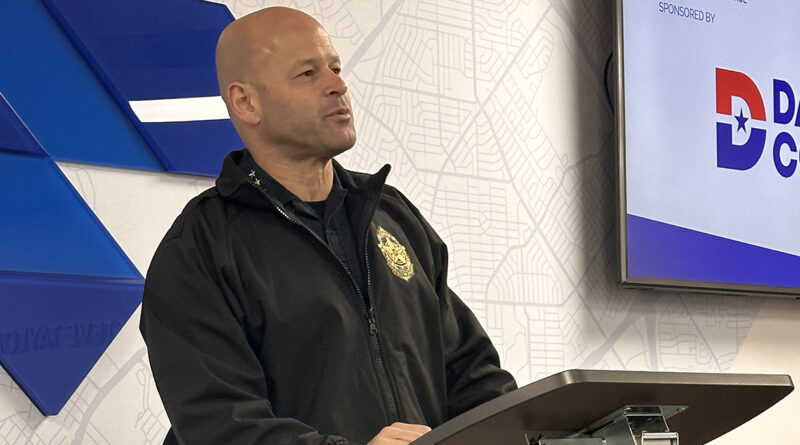Chief Outlines Vision for a Better Dallas
Garcia focused on crime, police culture, community solutions
Dallas Police Chief Eddie Garcia had four goals when he took command of his new department in 2021.
“To reduce violent crime, increase community trust, to improve department morale, and to do the best I can to ensure the next chief of police for the city of Dallas comes from within the department,” he said.
Born in Puerto Rico, Dallas’ first Latino police chief spent 29 years in the San Jose, California, police department before moving to Texas.
Under his direction, violent crimes are down overall 12%, and Dallas has 700-800 fewer victims of aggravated assault than last year. Gun crime related to aggravated assault, robbery, and murder is down in every division.
On Oct. 30, Garcia spoke at the North Dallas Chamber of Commerce Leadership Briefing on his goals for the police department and Dallas communities.
To achieve those goals, he has “partnered with criminologists from the University of Texas San Antonio and came (up) with a crime plan.”
Only 33% of the crime plan is law enforcement-centric, Garcia said. The rest involves investing in communities by “looking at an area … holistically” and deciding what that neighborhood needs to support families and people.
“(Police) are not the cure to the illness,” Garcia said. “We need to reinvest in people and places.”
In addition, Garcia talks about aiding those who may otherwise get involved with crime.
“If (they) need education, … if (they)need help coming out of prison … we want to have a holistic set of programs in place to help them succeed,” Garcia said.
Four months ago, the police department organized a “call-in session” to get those who had recently “committed shootings, are waiting for trial, (or) have been bonded” to hear about services to help them and their families. Of the 30 called, 20 took up services.
Garcia said he understands the importance of getting into the community, so he visited Bryan Elementary School, which is in an area that will “unfortunately” lead Dallas “in incarceration and victimization.”
“There’s no quick fix for this,” Garcia said. “What true success is going to be is when we do those prevention programs in those types of schools.”
He acknowledged that success may take a while. It could be 10-15 years before the city can look at those graduates and see fewer students becoming victims or winding up in the system.
The police department also must look within, Garcia said. Since coming to Dallas, he has had to terminate 30 officers, three of them for excessive force.
“I don’t regret doing that because we have to … hold ourselves accountable,” Garcia said.
Garcia plans to continue “building community trust” and being “as transparent as possible” to make Dallas one of the safest cities in the country.









